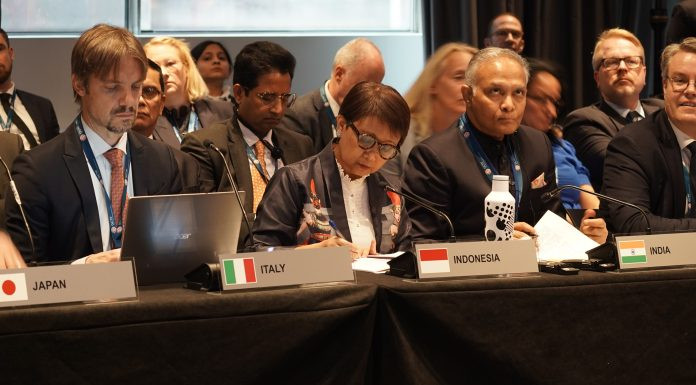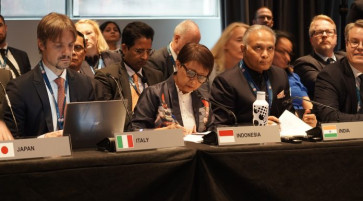Popular Reads
Top Results
Can't find what you're looking for?
View all search resultsPopular Reads
Top Results
Can't find what you're looking for?
View all search resultsIndonesia's pioneering efforts in rehabilitating and reintegrating former terrorists
Exposure to extremist ideologies and interactions with radicalized individuals in conflict zones could significantly contribute to an individual's involvement in violent activities upon their return.
Change text size
Gift Premium Articles
to Anyone
 Sharing session: Foreign Minister Retno LP Marsudi (second left, front) attends the 13th Ministerial Meeting of the Global Counter-Terrorism Forum (GCTF) on Sept. 20, 2023 in New York, where she spoke about the Indonesian government’s efforts to rehabilitate and reintegrate former terrorists. (Indonesian Foreign Ministry)
Sharing session: Foreign Minister Retno LP Marsudi (second left, front) attends the 13th Ministerial Meeting of the Global Counter-Terrorism Forum (GCTF) on Sept. 20, 2023 in New York, where she spoke about the Indonesian government’s efforts to rehabilitate and reintegrate former terrorists. (Indonesian Foreign Ministry)
I
n the bustling corridors of international diplomacy, where the world's leaders gathered to discuss pressing global issues, Foreign Minister Retno LP Marsudi stood at the forefront. This month, she addressed a distinguished audience at the 13th Ministerial Plenary Meeting of the Global Counter-Terrorism Forum (GCTF), held on the sidelines of the United Nations General Assembly's High-Level Week in New York.
Her message resonated with the gravity of the moment. She shared Indonesia's remarkable experiences in rehabilitating and reintegrating former terrorists, an issue conspicuously absent from the agenda of the ASEAN Summit in Jakarta early in September.
As the ASEAN Summit concluded, the world's attention remained captivated by the ongoing turmoil in Ukraine. Yet, amid the headlines and geopolitical tensions, a pressing issue lingered in the shadows, the repatriation and rehabilitation of Southeast Asians from Syrian camps, particularly those associated with the Islamic State (IS) movement.
The National Counterterrorism Agency (BNPT) has reported that approximately 300 Indonesians, including women and children, are still languishing in refugee camps in Syria. The shifting sands of global priorities mean that the fate of these individuals has taken a backseat, but time is running short. The Syrian camps could close, prompting the need for repatriation, and it was this impending challenge that the School of Strategic and Global Studies-University of Indonesia (SKSG-UI) sought to address.
On Sept. 5, the SKSG-UI released a groundbreaking policy paper outlining a path for repatriation and rehabilitation, focusing on women and children associated with foreign terrorist fighters. The policy paper's contribution to this issue's academic and policy debates cannot be overstated.
It raised critical questions about Indonesia's "buying time" strategy, an approach aimed at appeasing public opinion or special interest groups without committing to a long-term solution for repatriation. In particular, the policy paper emphasized the need for a more comprehensive and sustainable approach, particularly for the younger children caught up in this predicament, while also advocating for the inclusion of mothers and women in these pivotal decisions.
However, a few crucial issues deserve further examination amid the promising policy discussions, considering Indonesia's recent experiences in repatriating and rehabilitating its citizens.

















